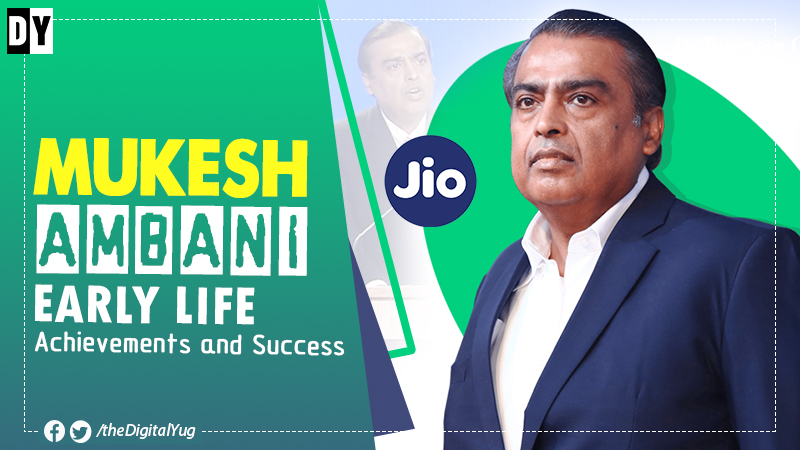
Mukesh Dhirubhai Ambani, the face of new emerging India, is the chairman and managing director (CMD) of Reliance Industries, which is one of India's largest private sector companies, a Fortune 500 group, and one of the world's largest private-sector conglomerates. He is the eldest son of late Reliance Industries founder Dhirubhai Ambani. Mukesh owns a 48 percent interest in Reliance Industries.
Mukesh was born on April 19, 1957, in Aden, Colony of Aden (now Yemen). He attended Abaay Morischa School in Mumbai and graduated from the UDCT, now Institute of Chemical Technology, in Mumbai with a bachelor's degree in Chemical Engineering. Later, he enrolled at Stanford University for an MBA program but dropped out in 1980.
In early 1980, during the reign of Indira Gandhi, the doors of PFY (Polyester Filament Yarn) manufacturing were opened to the private sector. Dhirubhai's father had applied for a license to start PFY, and despite strong competition from the Tatas, Birlas, and 43 other families, Dhirubhai was granted the license. Mukesh dropped out of college to help his father develop the PFY factory, which began Reliance's backward integration from textiles into polyester fibers, petrochemicals, petroleum refining, and upstream into oil and gas exploration and production in 1981.
Mukesh has not only taken over the reins and responsibilities of Reliance Industries Limited but has also been pivotal in making the business a global corporation, following in his father's footsteps of "dare to dream and learn to succeed." In the form of Reliance Infocomm Limited, he founded one of the world's largest and most complex information and communications technology initiatives (now Reliance Communications Limited).
He guided and led the construction of the world's largest grassroots petroleum refinery in Jamnagar, India, with a current capacity of 660,000 barrels per day (33 million tonnes per year) and integrated petrochemicals, power generation, port, and related infrastructure. He refused to resort to business fads or government pressure, opting instead to develop greenfield assets that generate 20% returns on investment rather than investing in overseas acquisitions.
Mukesh, an oracular thinker and optimist futurist at heart, is optimistic about the Indian economy's capabilities and prospects. India's economic success, he believes, would be driven by "inclusive" growth and "value addition."
Mukesh's major "power moment" occurred in 2007, when a quick rally in the Indian stock market and the strengthening of the Indian rupee increased the market capitalization of Reliance group firms, briefly making him the world's richest man. According to Forbes Magazine, he is expected to reclaim the title of "world's wealthiest man" in 2014. Within a month of taking office, he became the first Indian to visit US President Barack Obama.
After his split from Mukesh in 2006, his younger brother Anil Ambani formed the Reliance Anil Dhirubhai Ambani Group (ADAG), which competes with Mukesh.
Mukesh Ambani has been recognized as one of the world's most admired business leaders and has received several awards in recognition of his leadership abilities. The University of Pennsylvania awarded him the Dean's Medal in the School of Engineering and Applied Science in 2010. In 2007, he received the United States-India Business Council Leadership Award from the US-India Business Council. In the same year, the Gujarat government honored him with the Chitralekha Person of the Year Award. In 2004, Total Telecom presented him with the World Communication Prize.
Mukesh is a member of the board of directors of Bank of America Corporation and the international advisory board of the Council on Foreign Relations, in addition to being the president of the conglomerate empire. He previously served as the Chairman of the Indian Institute of Management in Bangalore (IIM-B). He is an Honorary Fellow of the Institute of Chemical Engineers (IChemE) (the Institution of Chemical Engineers)
He also owns the Mumbai Indians of the Indian Premier League, and his private 27-story hotel, Antilia, in Mumbai has made headlines. It is believed to be the most expensive home in history, with a construction cost of over USD1 billion.
Mukesh Ambani is the face of modern Indian industry, representing a bold picture of an urbane, developing, and innovative Indian business market. He will always be regarded as the business guru and the idol of every young Indian who aspires to emulate his achievements and make a name for him in the corporate world.
Now that we have discussed the achievements and accomplishments of Mr. Mukesh Ambani but here the question arises is what makes him different from the other entrepreneurs? How and why is he so successful? It was his vision and capacity to take forward his father's legacy.
In both his professional and personal lives, he had seen many highs and lows. After the tragic death of their father due to a stroke, relations with his younger brother Anil Ambani (another business tycoon and chairman of Reliance ADA Groups) have deteriorated. Mukesh Ambani also suffered a big setback when the NDA (National Democratic Alliance) government slapped Reliance Petroleum Industry with a $579 million fine.
Like any other businessman, Mr. Mukesh Ambani has suffered a loss in business, but it was his strong will and visionary mind with courage that has kept him going, making him India's richest man.
Latest Updates from around the world
Most read stories, topics, and videos
Latest Updates from around the world